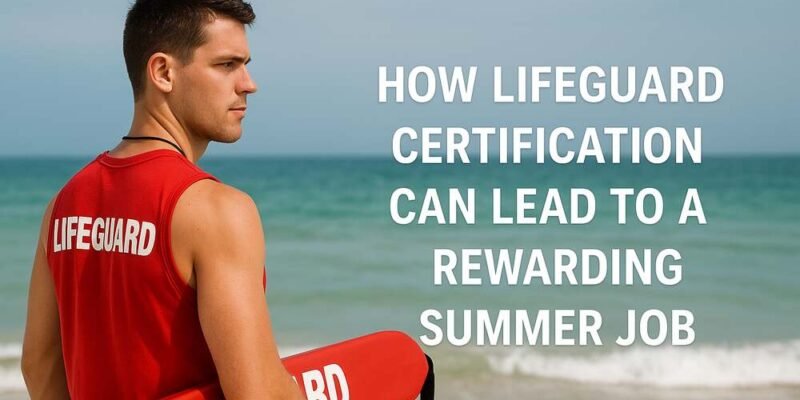The summer is when students, part-timers, and thrill-seekers harmoniously marry work and play. Among the various seasonal jobs, those by the water often stand out for their mix of duty and excitement, and an environment for personal development. With lifeguard certification, you can always expect to find a summer job that is worthwhile and respected in its setting. In the present article, we will discuss how lifeguard certification opens up other streams of fulfilling summer employment, the advantages of working as a lifeguard, the certification process, and how to get started with the best training.
Why Embark on Summer Jobs in Water?
Water jobs provide an excellent work-play balance. Beaches, pools, lakes, waterparks, or any location are always energetic, scenic, and dynamic. But there is a good purpose as well. As a lifeguard, your responsibilities include the safety and well-being of all swimmers and visitors. It helps build up discipline, confidence, and above all alertness. These three qualities will help you professionally as well as personally. It provides adolescents and young adults with what they need financially, physically, and socially to survive the harsh summer months, while also gaining the skills and experiences needed to enter a promising career in fitness or exercise, emergency services, or education.
Lifeguard Certification: Your Gateway to a Professional Career
Before slipping into that iconic red uniform and grabbing your whistle, you need to get your lifeguard certification. This isn’t just a box to check off—it’s a thorough training program that equips you for real-life emergencies. Lifeguard certification includes essential skills like:
- Water rescue techniques
- First aid and CPR
- AED usage
- Risk assessment and accident prevention
- Communication and teamwork under pressure
Completing a lifeguard certification course indicates to employers that you’re ready to handle emergencies and that you take this responsibility seriously. Plus, it ensures you’re physically and mentally prepared to tackle high-stress situations.
A Rewarding Job for People Who Lifeguard
The Difference You Make
Few summer jobs allow you to save lives. You come to work every day, preventing accidents, catching danger early, and acting quickly in an emergency. The ability to have that training, knowing that you could step in and save someone’s life, is incredibly empowering.
Developing Life Skills for a Lifetime
Lifeguarding teaches you safety techniques, but not all of them. Communication, decision-making, leadership, and observation skills improve. You can transfer these skills to many other professions and look amazing on resumes and college applications.
Stay Fit
Lifeguarding is a refreshing alternative if you don’t want to spend the summer behind a counter or at a desk. You’ll stay fit, spend time outdoors, and be active. Many lifeguards find that their physical demands help them maintain personal health and stamina throughout the summer season.
Building a Network and Friendship World
Lifeguards are often integral to teams, whether at a community pool, a resort, or even a waterpark. There, they will make some very strong ties and friendships that should last a lifetime. It is also a good place to begin networking, especially if the person is interested in public safety, physical education, or recreation management.
Where Are the Workplaces for Lifeguards?
Even if you complete your lifeguard certification, many job prospects lie ahead. You could work at:
- Swimming pools, private or public
- Lakeshores or Oceans
- Waterparks
- Country clubs
- Resorts and hotels
- Camps and recreational facilities
Each has distinctive demerits and merits. For example, a sea lifeguard requires more skill to navigate rip currents, while a pool lifeguard usually checks on children.
Start Your Lifeguard Certification
The first step to lifeguarding is admission into an approved certification course. This program is always offered but is in high demand before summer. Training consists of practice in and out of the water.
The Qualifications
To enrol, a candidate is usually required to shop from this list:
- Reach the minimum age (very typically, around 15 years)
- Swim a certain distance
- Have the ability to tread for a certain period
- Retrieval of an object from the deep end
Once enrolled, you will take part in several endurance tests, which are focused on detail, response time, and timing. When you complete the course, most of these will send you home with an official certification for lifeguarding, good for around two years.
Right Handle Clean-Up Jobs: The Identifying Features
Thus, after obtaining lifeguarding accreditation, the person can prepare to go out looking for work. Here are some tips to help find the best summer job:
- Apply: Early application works. Positions for lifeguards fill up fast when the job requirements are made known. Start searching by early spring.
- Tailor your resume: Include training and certification; list any previous work experience in water and pressure.
- Be flexible: Time restrictions may require early mornings, weekends, or holiday work. Providing flexibility increases the chance of securing any job.
- Fitness: Keeping in shape will enable a lifeguard to fulfil the physical requirements and is often required to assist in making rescues.
- Training: Regularly train on skills, mainly CPR and First Aid, so that they remain fresh in your mind.
Lifeguard Classes vs. Online Classes
Online training is a component of some lifeguard programs. However, practical training comes first in lifeguard training. The lifeguard classes are held in an open area, where the participants do actual rescues and give CPR to dummies. Disaster situations are organized, where they develop certain physical memories and situational awareness that the online course cannot teach. Beware of any program that promises entirely online or shortcuts to certification without practical testing. Regarding hiring, most employers prefer applicants with face-to-face training and supervised practical skills demonstrations.
Final Word: A Work Beyond Summer
To be a lifeguard is to forge an avenue of personal growth, responsibility, and lifelong skills. You could be a student on the hunt for summer work, an athlete looking to make some money while staying active, or a concerned citizen wanting to save lives—and, whichever the case, lifeguard certification is a prudent and rewarding decision. The experiences you gain are transferable long past the shore or pool and may even motivate a lifelong health, fitness, or emergency response career. This summer, you should swap indoor sports for work that genuinely lives in the field: saving lives, sunbathing, and creating memories. Enroll in a lifeguard certification program recognized by a reputable provider, such as the American Lifeguard Association, and prepare for a career that truly matters. Need help finding lifeguard classes near you?
Do Read: 10 Real-World Projects to Kickstart Your Data Science Portfolio in 2025













